Related Research Articles
Terence George is an Irish screenwriter and director. Much of his film work involves "The Troubles" in Northern Ireland.

Robert McKee is an author, lecturer and story consultant who is known for his "Story Seminar", which he developed when he was a professor at the University of Southern California. McKee is the author of Story: Substance, Structure, Style and the Principles of Screenwriting, Dialogue: the Art of Verbal Action for Stage, Page and Screen, Storynomics: Story-Driven Marketing in the Post-Advertising World and Character: The Art of Role and Cast Design for Page, Stage, and Screen. McKee also has the blog and online writers' resource "Storylogue".

Henri Verneuil was a French-Armenian playwright and filmmaker, who made a successful career in France. He was nominated for Oscar and Palme d'Or awards, and won Locarno International Film Festival, Edgar Allan Poe Awards, French Legion of Honor, Golden Globe Award, French National Academy of Cinema and Honorary Cesar awards.
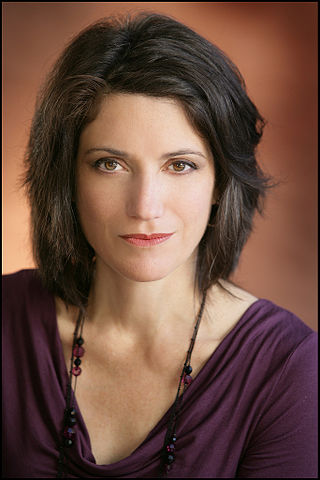
Carla Garapedian is a filmmaker, director, writer and broadcaster. She directed Children of the Secret State about North Korea and was an anchor for BBC World News. After leaving BBC World, she directed Dying for the President about Chechnya, Lifting the Veil, about women in Afghanistan, Iran Undercover and My Friend the Mercenary about the coup in Equatorial Guinea. Her feature, Screamers, was theatrically released in the U.S. in December 2006 and early 2007, and was on Newsweek's pick of non-fiction films for 2006/7. The Independent called it "powerful" and Larry King for CNN described it as "a brilliant film. Everyone should see it." The New York Times deemed it "invigorating and articulate," while the Los Angeles Times called it "eye-opening." "Carla Garapedian is a screamer, too," said the Washington Post.

The cinema of Armenia was established on 16 April 1923, when the Armenian State Committee of Cinema was established by government decree. The National Cinema Center of Armenia (NCAA), founded in 2006, is the governing body of film and cinema in Armenia. The NCAA preserves, promotes and develops Armenian cinematography and provides state financial support to full-length feature, short and animation projects. The Director of the NCCA is Shushanik Mirzakhanyan, and the headquarters are located in Yerevan.

The Blue Hour is a 2007 American drama film directed and written by Eric Nazarian. It stars Alyssa Milano and had its world premiere at the San Sebastián International Film Festival in 2007. Additionally, the film was selected by Nanni Moretti to screen at the 2007 Torino Film Festival, in Turin, Italy.
Gariné Torossian is a Canadian filmmaker. Her works include Stone, Time, Touch which won best documentary at the Warsaw International Film Festival in 2007. Her films have screened at MoMa, the Telluride Film Festival (Colorado), Lux Cinema (London), the Egyptian Theatre, the Jerusalem Film Festival, the Warsaw International Film Festival, Berlinale, and a host of cinematheques, including those in Berlin, Edmonton, Ottawa, Winnipeg and Vancouver. Torossian's debut short, Visions (1992), was part of a retrospective at Centre Pompidou when she was 22. Her subsequent shorts were screened at New York Museum of Modern Art Cineprobe series when she was 25, and at the Spielberg theatre at the Egyptian in Los Angeles (2019). Torossian's work has been broadcast on Arte France, Documentary Channel (Canada), Bravo Canada, Sundance Channel (USA), SBS (Australia) and WTN (Canada). Her films focus on notions of memory, longing and identity, underlined by her diverse and comprehensive filmography.

The Golden ApricotYerevan International Film Festival is an annual film festival held in Yerevan, Armenia. The festival was founded in 2004 with the co-operation of the "Golden Apricot" Fund for Cinema Development, the Armenian Association of Film Critics and Cinema Journalists. The GAIFF is continually supported by the Ministry of Foreign Affairs of Armenia, the Ministry of Culture of Armenia and the Benevolent Fund for Cultural Development.The objectives of the festival are "to present new works by the film directors and producers in Armenia and foreign cinematographers of Armenian descent and to promote creativity and originality in the area of cinema and video art".
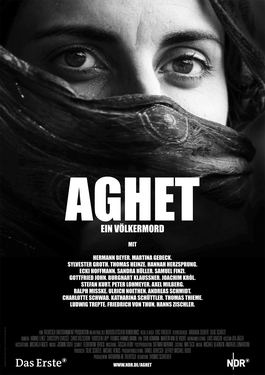
Aghet – Ein Völkermord is a 2010 German documentary film on the Armenian genocide by the Young Turk government of the Ottoman Empire during World War I. It is based on eyewitness reports by European and American personnel stationed in the Near East at the time, Armenian survivors and other contemporary witnesses which are recited by modern German actors. The visual material partly consists of secretly shot photographs of the death marches, Turkish atrocities and suffering of the Armenian deportees.
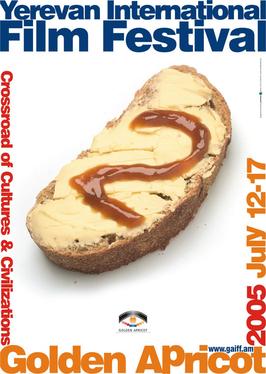
The 2nd Yerevan Golden Apricot International Film Festival was a film festival held in Yerevan, Armenia from 12–17 July 2005. Entries were submitted from 45 countries such as Russia, Argentina, the Netherlands, Afghanistan, Malaysia, Chile, Turkey, Finland, India, Israel, Iran and Canada. Following the selection, 144 films from 37 countries were included into competition and non-competition programs. Included amongst the guests and participants were some of the most highly acclaimed figures of world cinema such as Abbas Kiarostami, Krzysztof Zanussi, and Nikita Mikhalkov who were given Lifetime Achievement Awards. The main prizewinners of the 2nd Golden Apricot Festival were Alexander Sokurov, Russia, with his film The Sun, Pirjo Honkasalo, Finland, with The 3 Rooms of Melancholia, and Arman Yeritsyan, Armenia, with Under the Open Sky.
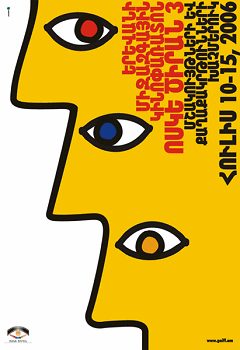
The 3rd Yerevan Golden Apricot International Film Festival was a film festival held in Yerevan, Armenia from 10–15 July 2006. The annual festival presented about 120 films from 43 countries. Participants included some of the most highly acclaimed figures of world cinema - such as Marco Bellocchio, Tonino Guerra, Mohsen Makhmalbaf, Godfrey Reggio and Artavazd Peleshyan, who were honored with Lifetime Achievement Awards. More than 110 foreign guests attended the festival, which included filmmakers, actors, producers and distributors. The festival was covered by a number of international media, including Euronews and Arte. The international juries, headed by Moritz de Hadeln, Godfrey Reggio and Arsinee Khanjian, awarded the following prizes: Golden Apricot 2006 for the Best Feature Film to Hou Hsiao-hsien for his film Three Times, (Taiwan/China/France); Golden Apricot 2006 for the Best Documentary Film to Workingman's Death by Michael Glawogger, (Austria); and Golden Apricot 2006 for the Best Film in "Armenian Panorama" to The Dwellers of Forgotten Islands by Hrant Hakobyan, (Armenia).

The 4th Yerevan Golden Apricot International Film Festival was a film festival held in Yerevan, Armenia from 9–14 July 2007. More than 120 films from around the world were presented during the festival with attendance from contemporary filmmakers such as Bruno Dumont, Leos Carax, Carla Garapedian, Lee Chang-dong, Andrey Zvyagintsev, Aurora Quattrocchi and Tchéky Karyo. Paolo and Vittorio Taviani (Italy), directors of The Lark Farm were honored with Lifetime Achievement Awards. The international juries, headed by An Cheong-sook, Martin Schweighofer (Austria), Vigen Chaldranyan (Armenia) awarded the following prizes: Golden Apricot 2007 for the Best Feature Film to Ulrich Seidl for his film Import/Export (Austria); Golden Apricot 2007 for the Best Documentary Film to Vardan Hovhannisyan for his film A Story of People in War and Peace (Armenia) and Golden Apricot 2007 for the Best Film in the “Armenian Panorama” to Screamers by Carla Garapedian (UK). Vardan Hovhannisyan was awarded with the FIPRESCI and Ecumenical Jury Prizes and Carla Garapedian (Screamers) was also awarded the Ecumenical Jury Price.

The 5th Yerevan Golden Apricot International Film Festival was a film festival held in Yerevan, Armenia from 13–20 July 2008. The festival had more than 450 submissions from 67 countries; viewers had an opportunity to see over 160 films. Among the honorable guests of the festival were Wim Wenders, Enrica Antonioni, Goran Paskaljevic, Dariush Mehrjui, Catherine Breillat, and others. A Special Tribute was paid to Michelangelo Antonioni by honoring him with a posthumous Parajanov’s Thaler. Additionally, Wim Wenders and Dariush Mehrjui were honored with Parajanov’s Thaler Lifetime Achievement Awards. The main prizewinners of the 5th Golden Apricot were Anna Melikian from Russia for her film The Mermaid, Meira Asher from Israel for the film Women See Lot of Things, and Eric Nazarian from the USA for The Blue Hour. The FIPRESCI Award went to Huseyn Karabey with his film My Marlon and Brando and the Ecumenical Award to Eric Nazarian with his film The Blue Hour.
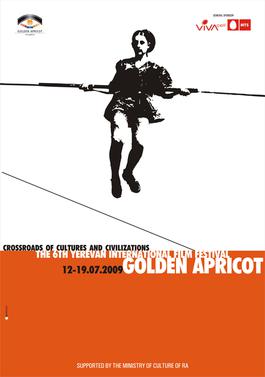
The 6th Yerevan Golden Apricot International Film Festival was a film festival held in Yerevan, Armenia from 12–19 July 2009. The annual festival had over 450 submissions from 67 countries, 150 of which were included into the competition and non-competition programs. Over 250 accredited press representatives covered the festival. This was the fourth year the festival was widely covered by Euronews. Among honorable guests were filmmakers Rob Nilsson, Kohei Oguri (Japan), Alexander Rodnyansky (Russia), Sergei Solovyov (Russia), actors Eric Bogosian, Arsinee Khanjian (Canada) and producer Alain Terzian. The international juries, headed by Kohei Oguri, Alexander Rodnyansky, Haig Balian (Netherlands) awarded the following prizes: Golden Apricot 2009 for the Best Feature Film to George Ovashvili for his film The Other Bank (Georgia); Golden Apricot 2009 for the Best Documentary Film to Anders Østergaard for his film Burma VJ - Reporting from a Closed Country (Denmark), and Golden Apricot 2009 for the Best Film in the “Armenian Panorama” to With Love and Gratitude by Arka Manukyan (Armenia). The FIPRESCI Award went to Ozcan Alper’s Autumn and the Ecumenical Award to George Ovashvili’s The Other Bank.

Nana Ekvtimishvili is a Georgian writer and director.

The 100th anniversary of the Armenian genocide was commemorated on April 24, 2015. April 24, 1915 is considered the beginning of the Armenian genocide, and is commonly known as Red Sunday, which saw the deportation and execution of many Armenian intellectuals.

1915 is a 2015 American psychological thriller film written and directed by Garin Hovannisian and Alec Mouhibian. The film stars Simon Abkarian, Angela Sarafyan, Nikolai Kinski, Debra Christofferson, Jim Piddock, and Samuel Page. It follows a mysterious director staging a play to bring the ghosts of a forgotten tragedy back to life on the 100th anniversary of the Armenian genocide.

The Last Inhabitant is a film directed by Jivan Avetisyan, based on the story "Last Inhabitant of Gurjevan" by Tsovinar Khachatryan.
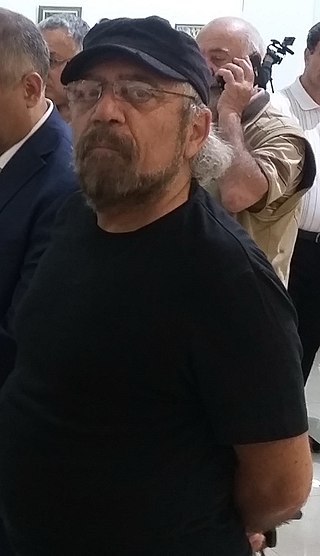
Ruben Kochar Armenian: Ռուբեն Երվանդի Քոչար is an Armenian film director, writer, producer and painter. He is an Honored Artist of Armenia.
References
- ↑ LLC, Helix Consulting. "Filmmaker Eric Nazarian: On eve of 100th anniversary of Armenian Genocide we need a catharsis". www.panorama.am.
- ↑ Official movie website Archived 2010-02-14 at the Wayback Machine Reviews from international cinema publications
- ↑ "CU: Eric Nazarian". USC.edu. December 10, 2008. Retrieved February 6, 2014.
- ↑ "Academy Nicholl Fellows 1986–Present". Oscars.org. Archived from the original on March 2, 2009. Retrieved February 6, 2014.